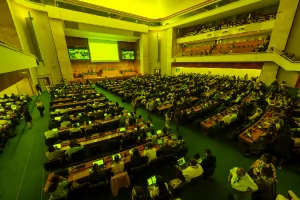
Well, it is kinda the end of the summer – now that we have the Labor Day weekend upon us. Wow!
It seemed reasonable to try to assess where we are on a number of issues that we have been following recently. These examinations all target the state of health of multilateralism. First the state of the Plastics Treaty, or not. I have looked at this before in a Post. The negotiation and the failure to move toward a Treaty underscores the diplomatic difficulty in achieving multilateral success in the current global relations context.
Then, there is the state of the UN – the central multilateral institution. Here too, I have looked at it previously in an earlier Post. What is at the heart of the failure of the UN; and is it fixable. We are examining the UN of course in the toxic context of Trump policymaking but the problems are real, with or without Trump. Now I was going to extend today’s Post to view the impact of Trump diplomacy on the international environment but I think I’ll save that for a later Post.
The Plastics Treaty
Well bluntly the Treaty, for the moment, is nowhere. As described by Joshua Lincoln at WPR:
“Negotiations on a treaty to limit global plastic waste ended last week not with a bang, but with a whimper. In the early hours of Aug. 15, after two compromise draft texts were rejected by various groupings within the 183 negotiating countries, the chair of the United Nations’ Intergovernmental Negotiating Committee simply adjourned the talks.”
“Beyond these substantive problems, there were thorny implementation and design issues: the voting threshold, scientific input, and other features needed to make the treaty’s implementation mechanisms effective, and the financing mechanism.” …
“But when China—the world’s largest producer of plastics—as well as India and Brazil put their thumbs on the scale in favor of a text with no global obligations and subject to a rigid consensus requirement at every future step, any remaining room for agreement evaporated.”
So, is it dead! Maybe not but new diplomatic paths need to be taken. This will take some daring by states but its time to consider different diplomatic strategies. As Lincoln suggests:
“When it comes to a plastics treaty, the divisions among states are now likely too wide to bridge via consensus, but other pathways may be available. A majority of states could seek a new negotiating mandate through a vote at the U.N. General Assembly, as was done for the Treaty on the Prohibition of Nuclear Weapons in 2016-2017. Or the same group could go outside the U.N. entirely, which has precedent in the 1997 Ottawa Convention on land mines. In both of those cases, a coalition of states forged ahead on their own, trusting that more countries would sign on over time, as they eventually did.”
Like-minded states need to suck it up and attack these global problems starting with ‘coalitions of the willing’.
UN at 80
At the upcoming 80th General Assembly session which will be held from September 22-30th, the UN will, according to the UN, devote itself to:
“The 80th session of the United Nations General Assembly – under the theme ‘Better together: 80 years and more for peace, development and human rights’ – comes at a pivotal moment to renew global commitment to multilateralism, solidarity and shared action for people and planet. This year’s high-level week highlights the urgency of delivering on the promise of the Sustainable Development Goals and reinvigorating global cooperation.”
But reality is about to intrude, I hope. The UN needs to ‘face the music’ when it comes to its future. As Helen Murphy describes at Devex, here is the world the UN faces:
“Under pressure from U.S. funding cuts, Secretary-General António Guterres is rolling out sweeping reforms through the UN80 Initiative. China, now the organization’s second-largest financial contributor, is pressing for more jobs and influence as Washington retreats.”
“The United Nations is bracing for sweeping change. Facing massive U.S. funding cuts, it has floated slashing 20% of its secretariat’s 33,000-strong workforce. And China — now the U.N.’s second-largest contributor — isn’t shy about seizing the opening. Chinese diplomats have pressed for more jobs for their nationals and even argued American staff should bear the brunt of any layoffs.”
Well the Chinese actions may be annoying but that is hardly the heart of the UN problem. Murphy goes on to describe the real future facing the UN:
“Launched in March by Guterres and led by U.N. Undersecretary-General for Policy Guy Ryder, UN80 boils down to three main prongs: belt-tightening in the secretariat, reviewing the 40,000 mandates handed down since 1945, and possible mergers across U.N. agencies with overlapping roles.”
“Behind it all is a brutal money crunch, writes Colum. Washington owes the U.N. more than $1.7 billion, mostly in unpaid peacekeeping dues. But “this is not simply a cost-cutting, downsizing effort,” Ryder insists. “The objective is to make the U.N. better.”
“Critics aren’t buying it. “Basically, [the current funding crisis is] because the U.S. stopped paying,” says Ian Richards, head of the U.N. staff union in Geneva. Meanwhile, Stewart Patrick of the Carnegie Endowment for International Peace calls it “a slash-and-burn approach,” adding, “they are basically unwittingly replicating a DOGE experiment at the United Nations.””
Yes, the fiscal crisis is real and needs to be addressed but it may require reducing the size of the UN as noted above. But that isn’t the end of it. As pointed out by Suzanne Nossel in a recent article in FP:
“The emergence of alternative multilateral bodies, great-power deadlocks, and global reductions in development assistance all threaten the U.N. in its current incarnation.”
But also there is more to it than just US ‘financial pressure’ and its determination to undermine multilateral organizations as well as all the problems identified by Nossel above. The UN has to face up to its dramatic inefficiency:
“This wavering support comes as the U.N. faces considerable organizational challenges. In recent decades, the U.N. has taken on a dizzying array of tasks and projects, many of which are out-of-date, overlap, or fail to achieve much.”
“Although the U.N. does irreplaceable and lifesaving work, it is saddled with ever-proliferating mandates that distract and detract from those essential endeavors. As part of a strategic review for the institution’s 80th birthday, Guterres commissioned an analysis of U.N. mandates, which was released in August. The study lays bare the organization’s inefficiency and mission creep, making the case for radical streamlining.”
“The new Report of the Mandate Implementation Review revealed an organization run amok. The U.N. has 22 distinct intergovernmental bodies; just the General Assembly, Security Council, Economic and Social Council, and Human Rights Council alone issue a total of more than 600 mandates.” per year, adding to a groaning total of more than 40,000 still-active mandates.”
“Mandates—which refer to U.N. bodies’ decisions, requests, and directives for action, such as creating a committee, conducting a study, or preparing a report—define the organization’s work. They can do everything from authorizing the deployment of thousands of peacekeepers, to requiring the preparation of a report on discrimination, to directing the work of a four-person accounting office, to adding to the existing list of more than 200 U.N. commemorative days (such as the International Day of Yoga). Regardless of its scope, each mandate demands effort from the U.N. Secretariat staff, who must carry out the mandate and report back to the entity that authorized it.”
“While the report did not appraise the value of individual mandates, it pulled no punches in exposing inefficiencies and waste. In fulfillment of these mandates, in 2024 alone, the U.N. held 27,000 meetings, incurring more than $360 million in direct costs associated with conference services and reports. Because there is no central registry of mandates, new ones are created without awareness of what is already being done. Since 1990, around 20 subjects have appeared every year in both General Assembly resolutions and ones adopted by either the Human Rights Council or the Economic and Social Council.”
So all these problems have accumulated over many years and it would appear that it is time, past time probably where the organization and its members have to tackle these critical problems. As Nossel concludes:
“The organization must seize the current cash crunch as a historic opportunity. Indeed, there are already sweeping proposals to remake the global body—including a leaked internal document that lays out an array of ideas to merge, eliminate, and relocate major U.N. functions.””
Really tough problems for multilateralism and its institutions with no guarantee that the organizations and its national members and staff and leadership have the will to tackle these very difficult problems.
This Post first appeared as a Substack Post at Alan’s Newsletter https://substack.com/home/post/p-172213259


